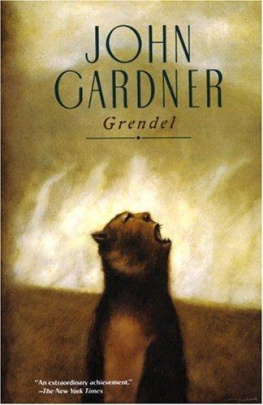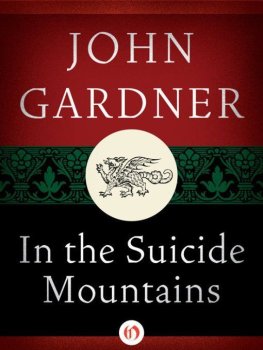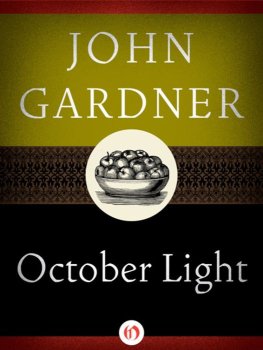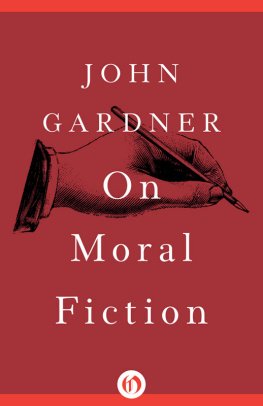John Gardner - Grendel
Here you can read online John Gardner - Grendel full text of the book (entire story) in english for free. Download pdf and epub, get meaning, cover and reviews about this ebook. year: 1989, genre: History. Description of the work, (preface) as well as reviews are available. Best literature library LitArk.com created for fans of good reading and offers a wide selection of genres:
Romance novel
Science fiction
Adventure
Detective
Science
History
Home and family
Prose
Art
Politics
Computer
Non-fiction
Religion
Business
Children
Humor
Choose a favorite category and find really read worthwhile books. Enjoy immersion in the world of imagination, feel the emotions of the characters or learn something new for yourself, make an fascinating discovery.
- Book:Grendel
- Author:
- Genre:
- Year:1989
- Rating:5 / 5
- Favourites:Add to favourites
- Your mark:
- 100
- 1
- 2
- 3
- 4
- 5
Grendel: summary, description and annotation
We offer to read an annotation, description, summary or preface (depends on what the author of the book "Grendel" wrote himself). If you haven't found the necessary information about the book — write in the comments, we will try to find it.
Grendel — read online for free the complete book (whole text) full work
Below is the text of the book, divided by pages. System saving the place of the last page read, allows you to conveniently read the book "Grendel" online for free, without having to search again every time where you left off. Put a bookmark, and you can go to the page where you finished reading at any time.
Font size:
Interval:
Bookmark:
For Joel and Lucy
The old ram stands looking down over rockslides, stupidly triumphant. I blink. I stare in horror. "Scat!" I hiss. "Go back to your cave, go back to your cowshed--whatever." He cocks his head like an elderly, slow-witted king, considers the angles, decides to ignore me. I stamp. I hammer the ground with my fists. I hurl a skull-size stone at him. He will not budge. I shake my two hairy fists at the sky and I let out a howl so unspeakable that the water at my feet turns sudden ice and even I myself am left uneasy. But the ram stays; the season is upon us. And so begins the twelfth year of my idiotic war.
The pain of it! The stupidity!
"Ah, well," I sigh, and shrug, trudge back to the trees.
Do not think my brains are squeezed shut, like the ram's, by the roots of horns. Flanks atremble, eyes like stones, he stares at as much of the world as he can see and feels it surging in him, filling his chest as the melting snow fills dried-out creekbeds, tickling his gross, lopsided balls and charging his brains with the same unrest that made him suffer last year at this time, and the year before, and the year before that. (He's forgotten them all.) His hindparts shiver with the usual joyful, mindless ache to mount whatever happens near--the storm piling up black towers to the west, some rotting, docile stump, some spraddle-legged ewe. I cannot bear to look. "Why can't these creatures discover a little dignity?" I ask the sky. The sky says nothing, predictably. I make a face, uplift a defiant middle finger, and give an obscene little kick. The sky ignores me, forever unimpressed. Him too I hate, the same as I hate these brainless budding trees, these brattling birds.
Not, of course, that I fool myself with thoughts that I'm more noble. Pointless, ridiculous monster crouched in the shadows, stinking of dead men, murdered children, martyred cows. (I am neither proud nor ashamed, understand. One more dull victim, leering at seasons that never were meant to be observed.) "Ah, sad one, poor old freak!" I cry, and hug myself, and laugh, letting out salt tears, he he! till I fall down gasping and sobbing. (It's mostly fake.) The sun spins mindlessly overhead, the shadows lengthen and shorten as if by plan. Small birds, with a high-pitched yelp, lay eggs. The tender grasses peek up, innocent yellow, through the ground: the children of the dead. (It was just here, this shocking green, that once when the moon was tombed in clouds, I tore off sly old Athelgard's head. Here, where the startling tiny jaws of crocuses snap at the late-winter sun like the heads of baby watersnakes, here I killed the old woman with the irongray hair. She tasted of urine and spleen, which made me spit. Sweet mulch for yellow blooms. Such are the tiresome memories of a shadow-shooter, earth-rim-roamer, walker of the world's weird wall.) "Waaah!" I cry, with another quick, nasty face at the sky, mournfully observing the way it is, bitterly remembering the way it was, and idiotically casting tomorrow's nets. "Aargh! Yaww!" I reel, smash trees. Disfigured son of lunatics. The big-boled oaks gaze down at me yellow with morning, beneath complexity. "No offense," I say, with a terrible, sycophantish smile, and tip an imaginary hat.
It was not always like this, of course. On occasion it's been worse.
No matter, no matter.
The doe in the clearing goes stiff at sight of my horridness, then remembers her legs and is gone. It makes me cross. "Blind prejudice!" I bawl at the splintered sunlight where half a second ago she stood. I wring my fingers, put on a long face. "Ah, the unfairness of everything," I say, and shake my head. It is a matter of fact that I have never killed a deer in all my life, and never will. Cows have more meat and, locked up in pens, are easier to catch. It is true, perhaps, that I feel some trifling dislike of deer, but no more dislike than I feel for other natural things--discounting men. But deer, like rabbits and bears and even men, can make, concerning my race, no delicate distinctions. That is their happiness: they see all life without observing it. They're buried in it like crabs in mud. Except men, of course. I am not in a mood, just yet, to talk of men.
So it goes with me day by day and age by age, I tell myself. Locked in the deadly progression of moon and stars. I shake my head, muttering darkly on shaded paths, holding conversation with the only friend and comfort this world affords, my shadow. Wild pigs clatter away through brush. A baby bird falls feet-up in my path, squeaking. With a crabby laugh, I let him lie, kind heaven's merciful bounty to some sick fox. So it goes with me, age by age. (Talking, talking. Spinning a web of words, pale walls of dreams, between myself and all I see.)
The first grim stirrings of springtime come (as I knew they must, having seen the ram), and even under the ground where I live, where no light breaks but the red of my fires and nothing stirs but the flickering shadows on my wet rock walls, or scampering rats on my piles of bones, or my mother's fat, foul bulk rolling over, restless again--molested by nightmares, old memories--I am aware in my chest of tuberstirrings in the blacksweet duff of the forest overhead. I feel my anger coming back, building up like invisible fire, and at last, when my soul can no longer resist, I go up--as mechanical as anything else--fists clenched against my lack of will, my belly growling, mindless as wind, for blood. I swim up through the firesnakes, hot dark whalecocks prowling the luminous green of the mere, and I surface with a gulp among churning waves and smoke. I crawl up onto the bank and catch my breath.
It's good at first to be out in the night, naked to the cold mechanics of the stars. Space hurls outward, falconswift, mounting like an irreversible injustice, a final disease. The cold night air is reality at last: indifferent to me as a stone face carved on a high cliff wall to show that the world is abandoned. So childhood too feels good at first, before one happens to notice the terrible sameness, age after age. I lie there resting in the steaming grass, the old lake hissing and gurgling behind me, whispering patterns of words my sanity resists. At last, heavy as an ice-capped mountain, I rise and work my way to the inner wall, beginning of wolfslopes, the edge of my realm. I stand in the high wind balanced, blackening the night with my stench, gazing down to cliffs that fall away to cliffs, and once again I am aware of my potential: I could die. I cackle with rage and suck in breath.
"Dark chasms!" I scream from the cliff-edge, "seize me! Seize me to your foul black bowels and crush my bones!" I am terrified at the sound of my own huge voice in the darkness. I stand there shaking from head to foot, moved to the deep-sea depths of my being, like a creature thrown into audience with thunder.
At the same time, I am secretly unfooled. The uproar is only my own shriek, and chasms are, like all things vast, inanimate. They will not snatch me in a thousand years, unless, in a lunatic fit of religion, I jump.
Next pageFont size:
Interval:
Bookmark:
Similar books «Grendel»
Look at similar books to Grendel. We have selected literature similar in name and meaning in the hope of providing readers with more options to find new, interesting, not yet read works.
Discussion, reviews of the book Grendel and just readers' own opinions. Leave your comments, write what you think about the work, its meaning or the main characters. Specify what exactly you liked and what you didn't like, and why you think so.








![John W. Gardner - Self-Renewal: The Individual and the Innovative Society [First Edition]](/uploads/posts/book/163439/thumbs/john-w-gardner-self-renewal-the-individual-and.jpg)



